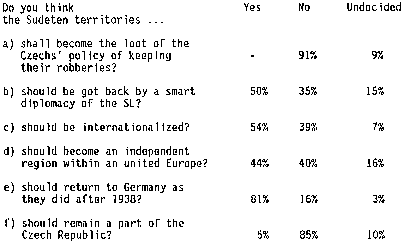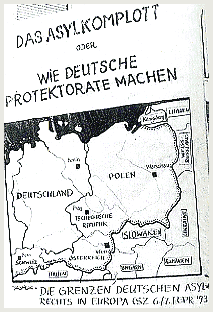|
German anti-fascist voices on the Sudetenland question
Extracts from speeches at an anti-fascist rally, held in
Munich on 29 September 1993, to commemorate the 1938 Munich Agreement,
under the title "Munich 1938 - Germany, united fatherland?"
Chaim Frank
Documentation Centre for Jewish Art and Culture in Munich,
an expert on the history of the Sudeten Germans.
It seems pointless for any sensible person still to be asking today to
whom the territory of the Czech Republic belongs, because every one
knows, even the least historically knowledgeable, that the Czech state
belongs to the Czechs, Slovakia belongs to the Slovaks and the land
beyond the Oder/Neisse frontier belongs to the Poles.
The fact is, however, that here in Germany and in Austria, there are
many who in their implacably revisionist imaginations still claim that,
for them, things are not so ordered. Among these people are numbered, in
particular, those from the exceptionally Germanic "Sudeten Tribe" who,
since 1945, together with the other so-called Volksdeutschen,
officially call themselves "exiles".
So, it is in no way provocative to ask at this point, who are these
so-called exiles and, as a next step, to enquire how on earth it was
they became exiled? Because, lefs face it, a guest who doesn't know how
to behave himself, or whose conduct is unbecoming and is therefore
thrown out of his hosfs house or some pub or other, would make himself
ridiculous if he were to claim that he was "exiled".
The Sudetens, Silesians and other Volksdeutschen, who annually
celebrate, here in Bavaria, their self-styled Homeland Day, simply will
not accept their actual status.
Thus, the statutes of every association in the federation of these
"expellees" encourage them in a belief that the unborn, yes, even
unconceived, children of the Sudetens and the Silesians are already
classed as "exiles".
Law
Paragraph 7 of the Federal Exiles Law, from 1971, legitimises this,
when it lays down the following: "Children bom
following exile, inherit the property, as exiles or refugees from the
Soviet Zone, which belonged or belongs to the parent at the time of
their birth or of legitimisation of welfare entitlement."
And why the exile-groups in the future will never diminish was
confirmed by Franz Neubauer, one of the top-exiles, at the 1988 annual
gathering of the hopeless: "... that every visitor who leaves us,
through death and old-age, will be replaced by someone younger."
So one can see that the ranks of the Sudetens and Silesians are a
different case from that of the old Nazis, who at least diminish
biologically as they slowly but surely die out. Admittedly though, the
latter's legacy' is a dangerous breed, when one considers the murderous,
foreigner-bashing young nazis of today.
Meanwhile, at least, some German and, of course, Austrian politicians
have realised that it is currently better not to have anything to do
with
old Nazis, or, even more so, young nazis. Some have even taken
into consideration the possible banning of some of the nazi groups,
although this consideration in no way applies to the expellees'
organisations. On the contrary, many politicians, of all parties, are
personally cultivating strong, decidedly comradely links with them. That
is remarkably odd, because -and it has long been obvious from their
publications since the very beginning -these Volksdeutsche
organisations are, from the ground up, revisionist orientated, and
what is worse, revisionist towards the historical watershed of the 1938
Munich Agreement.
What's more, these organisations and
confederations should be regarded as being of the extreme Right, on the
grounds of their convictions and especially their continuous outrageous
demands, because anyone who shouts about the "Justice and Legality" of
1938 is not Just a revisionist, but also a fascist.
In my view, because this is, according to its own claims at least, a
democratic country, all these fascist groups belong off the streets! The
justification is the existing paragraphs of the law designed to ban the
reactivation of nazism.
Myth
But this country's politicians such as, for example. Bavarian prime
minister Stoiber, along with other top Bavarian conservative figures
like Theo Waigel, Max Streibl, Peter Gauweiler,
or whatever their names might be, together with their party managers
think differently. They court these so-called exiles with not only the
intention of securing their votes, but in order to further their own
purposes, namely a decisive grab -
eastwards.

Pict.: Deputy Interior Minister Eduard Lintner,
leading member of revanchist Sudetendeutsche Landsmannschaft
Many institutions, such as the Right-wing Seidl-Foundation and various
Southeast Europe Societies, have long been operating in strategic spots,
from Prague to Odessa and from Croatia to the Volga area, and the
Deutsche Bank has already reopened a branch in Kaliningrad.
The greedy, grasping exile organisations, meanwhile, overlook the fact
that for centuries they were only guests in the Slav countries. In the
beginning, the Germans were "tolerated", as guests who were given an
unrestricted freedom to settle when economic depression struck the
German Empire as a result of numerous small wars.
In modem terminology, they were "economic refugees", who were later to
be joined by other Germans, victims of religious wars and intolerance.
In contrast to Germany today, these
refugees were guaranteed a secure right of residence.
The story of the foundation of German cities in
the East is to such a large extent based on legend and myth that it
bears no relation to the actual historical record. In fact, if one takes
a close look at the earliest German settlements, one is drawn to the
conclusion that they were placed primarily in areas already civilised
and settled by the Slavs. Because of the constant influx, the original
inhabitants were gradually driven out, and the Germans then began, with
enormous enthusiasm, to Germanise the surrounding areas very rapidly.
What could not be taken by peaceful means was sorted out with the swords
of the Teutonic Knights, under the banner of "Subduing and
Christianising".
It is also abundantly clear that not only was German law forced upon
the conquered lands, from Bohemia to the Baltic, but that it was the
Germans who were Freemen and the Czechs, for example, who were vassals
of the Dukes. Naturally, all this didn't happen overnight but occurred
over centuries. Above all, towards the end of the fifteenth century, a
new and tragic epoch in Slav history began to unfold, in particular, in
and around the countries of Bohemia and Moravia,
which had fallen to the Habsburgs. The gravest tragedy of all was in
1620, with the defeat at the White Mountain near Prague, which resulted
in the loss of Czech national independence for the next 300 years.
Germanisation
As if that were not sufficient, there eventually arose the problem of
rapidly expanding Germanisation, brought about ly Austro-Gennan
infiltration which went on uninterruptedly until the First World War. A
consequence of this was the imposition of German as the state language.
It did not act as an instrument of national reconciliation but as a
political weapon of oppression.
Every little move towards Slav self-realisation was immediately nipped
in the bud, destroyed down to the root, and the slightest feeling of
Czech self-worth was trampled under foot.
An example here, from the much-praised, apparently liberally disposed
theologist, Theodor Mommsen, who once told the Sudeten-Germans: "Be
hard! The Czech skull cannot absorb knowledge, but even it is accessible
to blows." (Freie neue Presse; Vienna,
31.10.1897)
The founding of the Czech Republic in 1918 immediately led to political
tension, as the Sudetens simply would not play ball with the new
arrangements, even though the young state
conceded considerably more rights to its minorities than the Czechs had
ever enjoyed under Pan-Germanism.

About 200 questionnaires are of course not representative enough,
but the main stream of opinion is obvious.
Translation of questionnaire and results distributed at revanchist Sudeten
rallies
Confirmation can be found in the documentation Die Vergangenheit
warnt by Dr. Vaclav Krai: "The position of the Sudeten Germans in
Czechoslovakia, despite their non-cooperative attitude towards the
Czechoslovak state, could not be compared to that of other national
minorities anywhere else in Europe. Apart from the monopoly of state
violence, they retained everything that they had had in the
Austro-Hungarian Empire. They retained their cultural unity, their
theatre, their organisations and institutions etc..."
Basically, however, the political structure of the Sudetens, as with
the Sile-sians, was only a tool of others. As the Nazis eventually put
it: "Czechoslovakia forms an obstacle to the German push to the East and
to mastery of Europe." hi similar vein, Bismarck commented much earlier,
on "Fortress Europe": "Whosoever holds Bohemia holds Europe."
Nazis
With the formation of the Deutsche National-Partei and the Deutsche
Nationalsozialistische Arbeiter Partei - both
Sudeten, pro-fascist and antisemitic (and this was as early as 1919) -
the foundations were laid for what would eventually, from 1933,
fundamentally shake Europe.
It can be seen that the later Nazi party was no discovery of the
Austrian Adolf Hitler, but that of the "nicer" Sudetens. Thus, the first
stone was thrown, and then came, as it must come, the flame of hatred.
Violence quickly took a hold all around, violence that was brutal and
unstoppable.
Konrad Henlein's nazi Sudetens terrorised the Czech population equally
as much as they terrorised the anti-Nazis and Jews who had fled from
Hitler's German Reich. One of the first victims of these crazed
Sudeten gangs, as early as 1933, was the well-known German author
Theodore Lessing, who had fled to Karlsbad - Karlovy Vary - to escape
the Nazis in Germany and ended up being shot in
the back in broad daylight.
When Hitler assumed power in 1933, the Nazis achieved "respectability"
on a political level across Europe and Konrad Henlein knew, as did the
Nazis, how to make a name for himself, as he attempted, under the
cloak of anti-Bolshevism, to further his campaign for "the Sudeten
German Question" in the League of Nations.
Meanwhile, he stepped-up his own campaign of terror in Czechoslovakia
together with his like-minded rabble, in order artificially to stimulate
the conflict he needed. Just how well the Nazis understood how to
control their ingenious strategy for a "New Order in Europe" for the
purposes of Greater Germany, was noted by the former French ambassador
Andre Francois-Poncet in his autobiography: 'The method involved first
applying a well-thought-out and increasing aggravation to the dissident
elements in the country, with a view to either giving them power or
crushing them. For this purpose, agents were found, either from outside
or inside of the country. Incidents caused by them were then reported in
detail, and with increasing frequency in the Goebbels' Nazi press; much
exaggerated in order to keep public opinion on tenterhooks and to
prepare an international mood of crisis."
Winston Churchill, in his memoirs written post-war, seems to an extent
to have understood this, unfortunately much too late: "German propaganda
and the German forces could be used against the Western border of
Czechoslovakia because in the Western border area, where the Sudetens
were settled, an aggressive German-nationalistic party was active,
waiting to act as a fifth column in the event of trouble." As we now
know, this is how things happened.
Following Hitler's secret order to the Wehrmacht to crush
Czechoslovakia, on 30 May 1938, and the assistance given by the
aggressive activities of the "fifth column" - provocations which led to
heavy clashes between the Nazis and the Czechs - came that which Hitler
wanted: the infamous Munich conference of 29 September 1938.
Here in Munich - allow me the unhistorical expression - they licked
Hitler's backside conceitedly - Chamberlain, Daladier and Mussolini.
Thus was one of Hitler's most significant objectives met: the ceding of
the territory in which the Sudetens lived, to the German Nazi Reich,
with the apparent agreement of Europe. It was then just a matter of
blinking an eye before the Nazi leader, without undue fuss, gave the
order on 21 October 1938 to "finish-off 'left-over' Czechoslovakia".
The last pulse of the Czech population flickered out with the
proclamation of the "Reich's Protectorate of Bohemia and Moravia" on 16
March 1939.
Liquidation
The sporadic Henlein terror had raged shortly before. Now began the
tightly organised liquidation of Czechs, Jews and Roma by means of the
concentration camp at Theresienstadt and the later systematic
deportations to Ausch-witz, Dachau, Mauthausen, Sobibor and Treblinka.
The suffering meted out to Czechs, Jews and Roma
during the Nazi occupation was incalculable and brutal beyond measure.
That said, a large part of the Czech intelligentsia, its cultural
sector, including many scientists, composers and writers was exiled,
transported to concentration camps or, worse still, gassed and murdered.
Some of the most active assistants in murder were, naturally,
Volksdeutsche. Not a few were actually operating as camp commandants
and guards at the extermination camps.

Anti-fascists protest at German
"blackmail policy" in the East |

The Asylum Plot:
How Germany creates protectorates |
So, if there were "exiles" in this context, during the Second World
War, then they were the Czechs. It was the Czechs who, at the time of
the Austro-German repression, had to leave their country and ultimately
it was the Czechs who had to flee because of the savage onslaught by the
German-Austrian Nazi hordes and because of Henlein's Sudeten thugs. With
these exiled Czechs and, of course, first and foremost the murdered Jews
and Czechs and most certainly the towns of Lidice and Leczoky together
with their murdered inhabitants, lies my deepest sympathy because they
became the victims of the brutal Nazi lunatic, who, wherever he set
foot, polluted and destroyed every thing.
Yet, and I confess this often, I have no sympathy whatsoever with those
responsible, the Sudetens or Volksdeutsche, who were rightfully
expelled from Eastern European countries, because they thought only of
themselves and their own fate and caused more evil with their fascism
than any amount of good they did for their host countries.
Certainly, they weren't all bad, and it would be understandable to ask:
when two in a family are bad, is then the whole family bad? Of course
not. Nevertheless, the proper question is: if a hundred people behaved
decently, were the other million Sudetens honest? No, the mass was
simply not honest. Quite the opposite, the few who perhaps possessed
some character were, because of the criminal character of the others,
made to suffer and were forced, exactly like the others, to leave the
Czech Republic in 1946.
On the other hand - lefs be honest - if we
remember post-war Germany, if we look at it closely, how would it have
looked here, if there had not been all these expellees, who since 1946
had been repatriated to this, their chosen German homeland? I mean,
because of the countless German dead, for whom Germany was responsible,
having started the war, there could not have been such a speedy
rebuilding.
Potsdam
In this connection, I have found an interesting article from the
Neue Zeitung of 29 April 1946: "By decision of the Potsdam Conference,
it is decreed that 8-10 million Germans are to be expelled from Eastern,
Central and Southern Europe. The return of these millions faces a
reduced Germany, split into four economic and transport zones, with a
monstrous task. The positive side of having to accommodate millions of
German re-immigrants in the US Zone lies in the arrival of highly
qualified craftsmen and handworkers. On the crafts side, the
export-power of the new arrivals in Bavaria alone has been estimated at
an annual 200,000,000 Marks."
And for Bavaria-fans, I quote also: "In planning new industries in
Bavaria, consideration is being given, for the purposes of keeping-up
export capabilities, to providing certain branches of industry with
their own settlements, to provide labour and support for individual
firms. Alongside the general rules for choice of location, attention
would be paid to ensuring that factories are located in areas which as
much by virtue of their population makeup as for their situation,
provide for a speedy settling-in. Bavaria will benefit particularly in
this respect, from the settlement of Sudeten Germans which will bring
new, particularly productive undertakings here."
Really, these "homecomers" should be pleased, living here in their own
homeland, which after all, they helped to build and set up. But, and
this is to be seen every year at their Homeland Days, this success and
what has been won isn't enough for them. They never have enough. On the
contrary, they always want more. Apart from which,
they shudder with terror at the foreigners who are slaving away here,
because they are afraid that they will be pres-sured by Turks and
Yugoslavians, or asylum-seekers, in the same way that they, in fact,
once pressured the Czechs and Poles.
Perhaps, though, it is only their well-known possessive nature, of
which people say: The Germans are always unhappy and discontented. On
the one hand, because they never get what they want, such as the eastern
Territories or the Olympic Games as they had them in Berlin in 1936,
and, on the other hand, they are unhappy because they have something
which they no longer want, for example East Germany.
And the cries of pain will continue over the coming years. Perhaps we
should start getting worried, though - all the signs are that maybe
soon, more than just a few will be wanting a Fuhrer again, even if ifs
only a little one, and it would be fitting for the new Reich's capital
Berlin, from where another "Konrad Henlein"-type can be delegated to the
reconquest of the Sudetengau.
I'll finish my address with the now famous words of the Czech
journalist and author Julius Fucik who was murdered by the Nazis:
"People, stay alert!"
hagalil.com
31-10-02 |